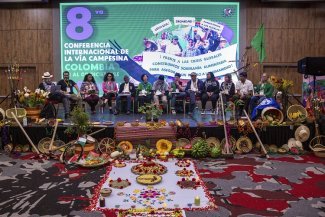At first glance, the United Kingdom appears to be at the forefront of the international fight against forced labour and trafficking. This March, it passed the Modern Slavery Act, becoming the first country in the European Union and one of the first countries in the world to attempt to tackle – in law – the modern manifestations of slavery, which affect as many as 13,000 people in the UK and an estimated 21 million people globally.
According to the UK Home Office, the Act “significantly enhances support and protection for victims, gives law enforcement the tools they need to target today’s slave drivers, ensures perpetrators can be severely punished, and includes a world leading provision to encourage business to take action to ensure their end-to-end supply chains are slavery free.”
But what the law says and what the law does is quite different, according to campaigners. Sean Bamford, a policy officer with the UK’s Trades Union Congress (TUC) working on trafficking and forced labour, says there isn’t much that new about the Modern Slavery Act, as essentially it “tidies up” pre-existing laws into a single bill.
“Consolidation can be a good idea but it was perfectly evident to us that in existing law there was inadequate protection and support for victims of trafficking and forced labour. The new bill doesn’t address this at all.”
Significantly, the law also fails to cohere with elements of Britain’s increasingly restrictive and punitive immigration policy; and nowhere is this incongruence more apparent than in the treatment of migrant domestic workers.
As a publication produced by the International Trade Union Confederation (ITUC) explains, attempts to look at the gender aspects of trafficking tend to focus on women and sexual exploitation, but domestic workers offers a stark example of the interplay between gender and labour trafficking.
An estimated 16,000 migrants, nearly all women, come to the UK on domestic worker visas each year. Excluded from most labour laws, they work in private households, often without clear terms of employment. As a result, they are extremely vulnerable to exploitation and abuse such as overwork, unpaid wages, restrictions on freedom of movement, sexual harassment, psychological abuse and violence.
A change to UK immigration rules in April 2012 made “the most disadvantageous labour migration status that exists” even more so. Now, migrant domestic workers entering the UK are tied to a single employer and can only work for a maximum of six months.
Kate Roberts, head of policy at the UK migrant domestic workers advocacy group Kalayaan, is one of the most vocal critics of the tied visa. “The UK’s immigration policy confines domestic workers to the status of chattel. They have no real rights for themselves. They are additional baggage who are only allowed in the UK for the benefit of another, more desirable category of worker”.
She reveals that Kalayaan has seen an increase in the reports of abuse and exploitation since the rule changes, as well as a significant decrease in the number of people coming forward to ask for help.
Priya is one such victim. Arriving in the UK on a tied visa with a family from the Middle East, she was forced to work from 06.00 to 01.00 seven days a week, cooking, cleaning and looking after three small children. Forbidden from taking meal breaks, she survived on leftovers and was made to sleep on the kitchen floor.
Priya eventually ran away but as her visa was tied to her employer, she found herself in the country illegally, forcing her into poorly paid, precarious work and dangerous situations which resulted in her being sexually harassed and raped. She is currently receiving assistance from Kalayaan but there are thousands of others who do not ask for help because they are afraid of being criminalised.
“These workers have no way of realistically challenging any mistreatment or abuse,” explains Roberts. “If they leave their employer for whatever reason, they are in breach of immigration laws.”
In September, minor changes were made to UK immigration rules for migrant domestic workers in response to the criticism. Domestic workers identified by the National Referral Mechanism framework as trafficked will be granted a six-month visa.
However, the prevention of trafficking and forced labour was not mentioned in the amendments, and domestic workers still have no recourse to public funds or any protection.
Colin Yeo, a UK immigration lawyer who runs the Free Movement blog said the changes were “about as begrudging as can be imagined considering what the victim will have been through.”
Reinstatement
What campaigners want is a reinstatement of the pre-2012 protections for domestic workers and the ratification of the International Labour Organisation’s Convention 189 on domestic work.
Under the original Overseas Domestic Workers visa, introduced in 1998, migrant domestic workers had basic employment rights and were not tied to a single employer. A 2009 Home Affairs Select Committee on trafficking described the visa as “the single most important issue in the prevention of the enslavement and trafficking of such workers,” says Roberts.
So why did the government end it in 2012? Ultimately, concerns over immigration trumped any concerns over human rights. “Things are not driven by a deep concern of vulnerable workers in difficult conditions; it’s driven by politics,” says Bamford.
“We now have a Tory majority government and reducing migration is absolutely fundamental as far as the Conservatives are concerned,” he says, despite all the evidence showing that the resulting skills shortage will have an adverse effect on the UK economy.
"One of the reasons they gave [for stopping the visa in 2012], unbelievably, is that the route was being abused," explains Roberts. "But we have never seen any evidence of this. It is absolutely bizarre to say the route is being abused when there is evidence that there is an increase in real people being abused as a result of being tied by the immigration rules to their employer."
This is why the ratification and implementation of the ILO’s Forced Labour Protocol is considered so urgent; it’s also why the innovative work of programmes like the EU-funded Fine Tune project [an alliance of trade unions, NGOs and faith-based organisations working together to improve responses to labour trafficking] are so important. For too long, activists say, trafficking and forced labour have been considered through a crime lens – its time, they say, to consider it a human and workers’ rights issue first and foremost.
The ILO is currently running a global campaign to persuade 50 countries to ratify the Protocol by 2018. So far only Niger has signed up but Bamford is confident that the UK will be one of the signatories. Getting the British government to ratify Convention 189, however, won’t be quite so easy.
“We’ve been told that it will be too difficult because domestic workers are excluded from the EU Working Time Directive and the European Framework Directive on Health and Safety at Work. But what it really comes down to is the right of inspection of the health and safety executive. The rights of the homeowner and employer are seen as more important that any rights of the worker.”
But all hope is not lost for migrant domestic workers in the UK. Home Secretary Theresa May has ordered an independent review into the tied visa which should be concluded later this month. For Roberts, there is no doubt about what must happen next. “It is so clearly wrong and it has been so widely condemned that the tying of domestic workers to their employers will have to change some time. It is just a question of how many years it will take and how many domestic workers will have to suffer in the meantime.“









